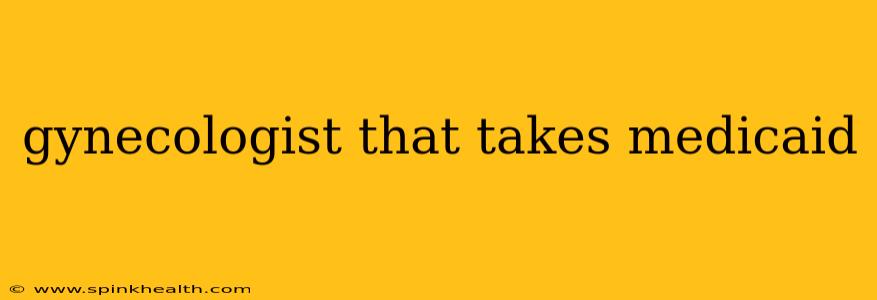Navigating the healthcare system can feel like a maze, especially when you're looking for specific services and need to consider insurance coverage. Finding a gynecologist who accepts Medicaid adds another layer of complexity. This isn't just about finding a doctor; it's about finding a healthcare provider you trust and feel comfortable with, all while managing the financial aspects of your care. Let's unravel this together.
What is Medicaid, and How Does it Work with Gynecological Care?
Medicaid is a joint federal and state program that provides healthcare coverage to millions of low-income Americans, including women. The specifics of coverage can vary from state to state, so it's crucial to understand your state's Medicaid program. While Medicaid generally covers essential gynecological services, the extent of coverage—such as preventative screenings, contraception, and treatment for specific conditions—can differ. You'll want to check your state's Medicaid website or contact your local Medicaid office for the most accurate and up-to-date information on your specific benefits.
How Can I Find a Gynecologist Who Accepts Medicaid in My Area?
This is often the most challenging part. Simply searching "gynecologist near me" on your favorite search engine might not yield the results you need. Here are several strategies that can help you find a gynecologist who accepts Medicaid:
1. Using Online Directories:
Many online directories specialize in finding healthcare providers who accept specific insurance plans, including Medicaid. Websites such as your state's Medicaid website (often linked through the state's health department), and others often feature provider search tools. Input your location and insurance information, and the directory will list appropriate providers.
2. Contacting Your State's Medicaid Office:
Your state's Medicaid office is an invaluable resource. Their staff can help you navigate the intricacies of your coverage and provide a list of gynecologists in your area who participate in the Medicaid program. They can also answer questions about specific procedures or medications covered under your plan.
3. Checking with Local Hospitals and Clinics:
Many hospitals and community health centers have gynecology departments and accept Medicaid patients. Contacting these facilities directly is another effective way to find a suitable provider. Often, their websites list the doctors and their specializations, along with accepted insurance.
4. Asking for Referrals:
Don't underestimate the power of word-of-mouth. Talk to friends, family members, or your primary care physician for recommendations. They may know of a trusted gynecologist in your area who accepts Medicaid.
What Questions Should I Ask Potential Gynecologists?
Once you've compiled a list of potential gynecologists, schedule brief phone calls or virtual consultations to ask important questions. These might include:
What is your experience with Medicaid patients?
This helps gauge their comfort level and familiarity with the insurance process.
What specific gynecological services are covered under my Medicaid plan?
Understanding the scope of coverage will prevent any unexpected billing surprises.
What is your approach to patient care?
Understanding their philosophy is critical in establishing a trusting relationship.
What is the process for scheduling appointments and receiving test results?
What Happens If My Preferred Gynecologist Doesn't Take Medicaid?
If your preferred gynecologist doesn't accept Medicaid, don't despair. Explore options like negotiating a payment plan, seeing if they offer a sliding fee scale based on income, or researching other local providers who might accept your insurance.
Finding the right gynecologist is a personal journey that requires time and effort. By using these strategies and asking the right questions, you can successfully find a qualified provider who accepts Medicaid and provides the compassionate care you deserve. Remember to always verify coverage with your Medicaid provider and the doctor's office before your appointment to avoid any unexpected costs.

